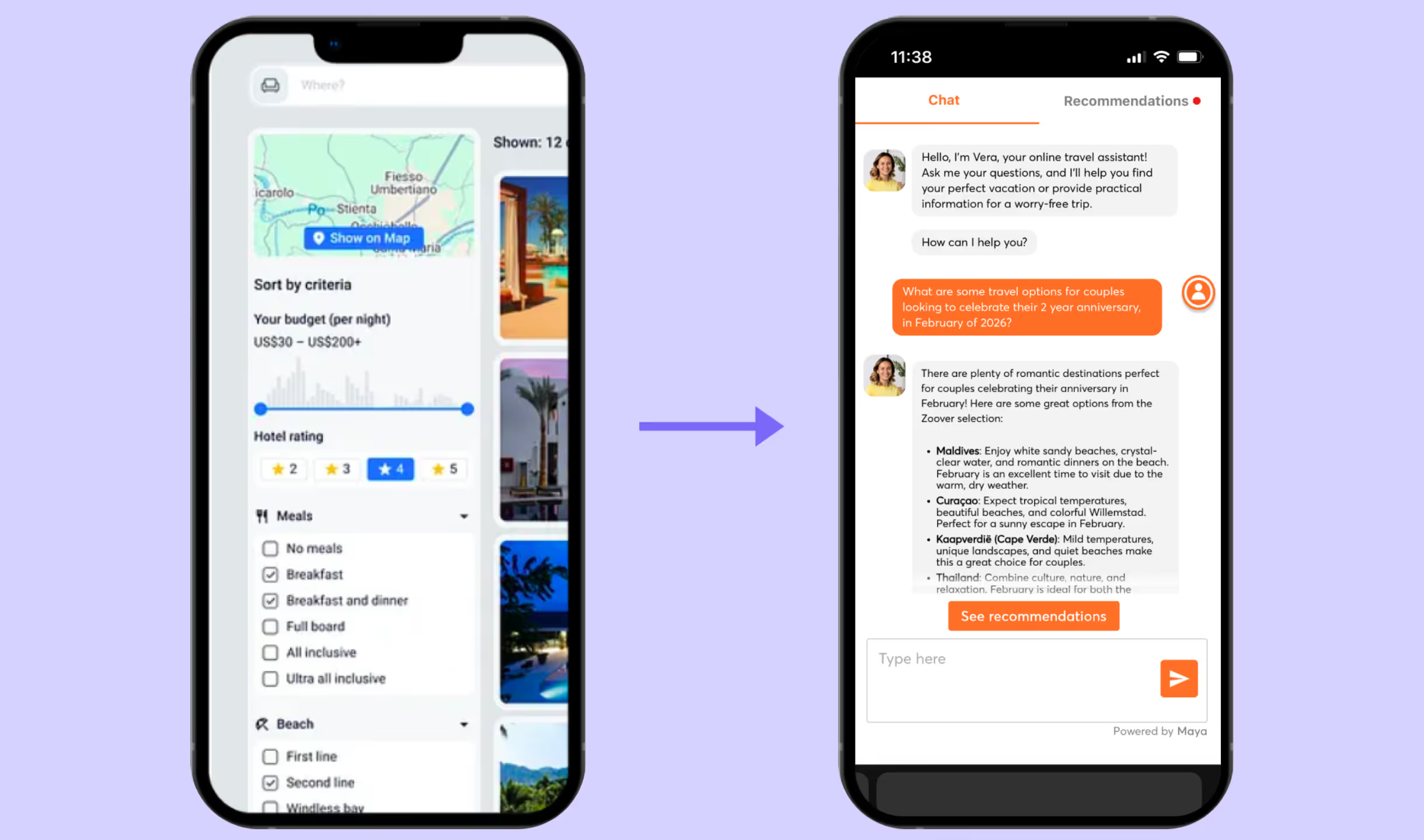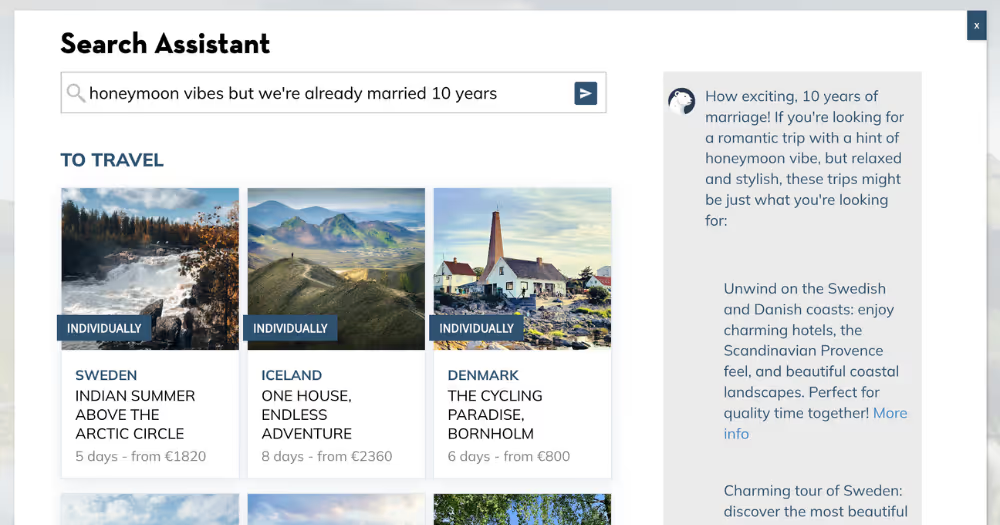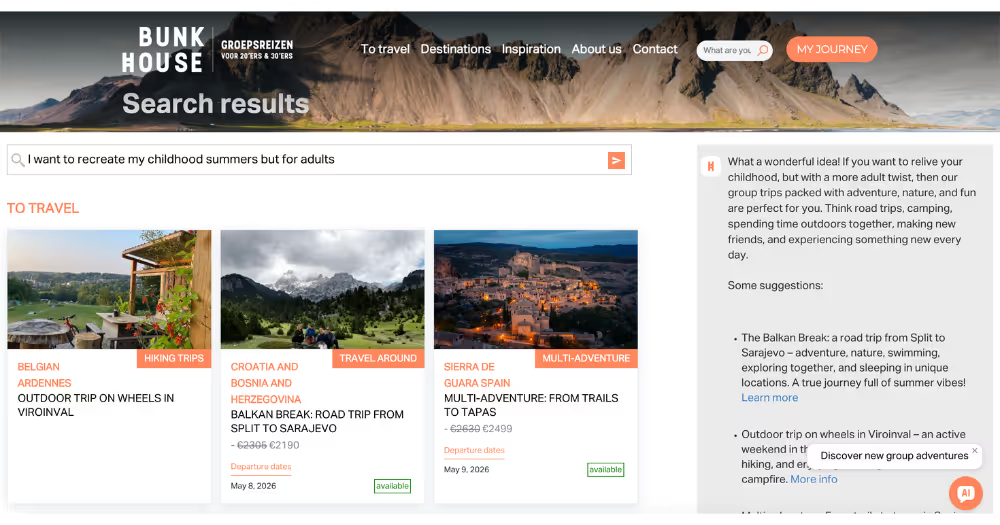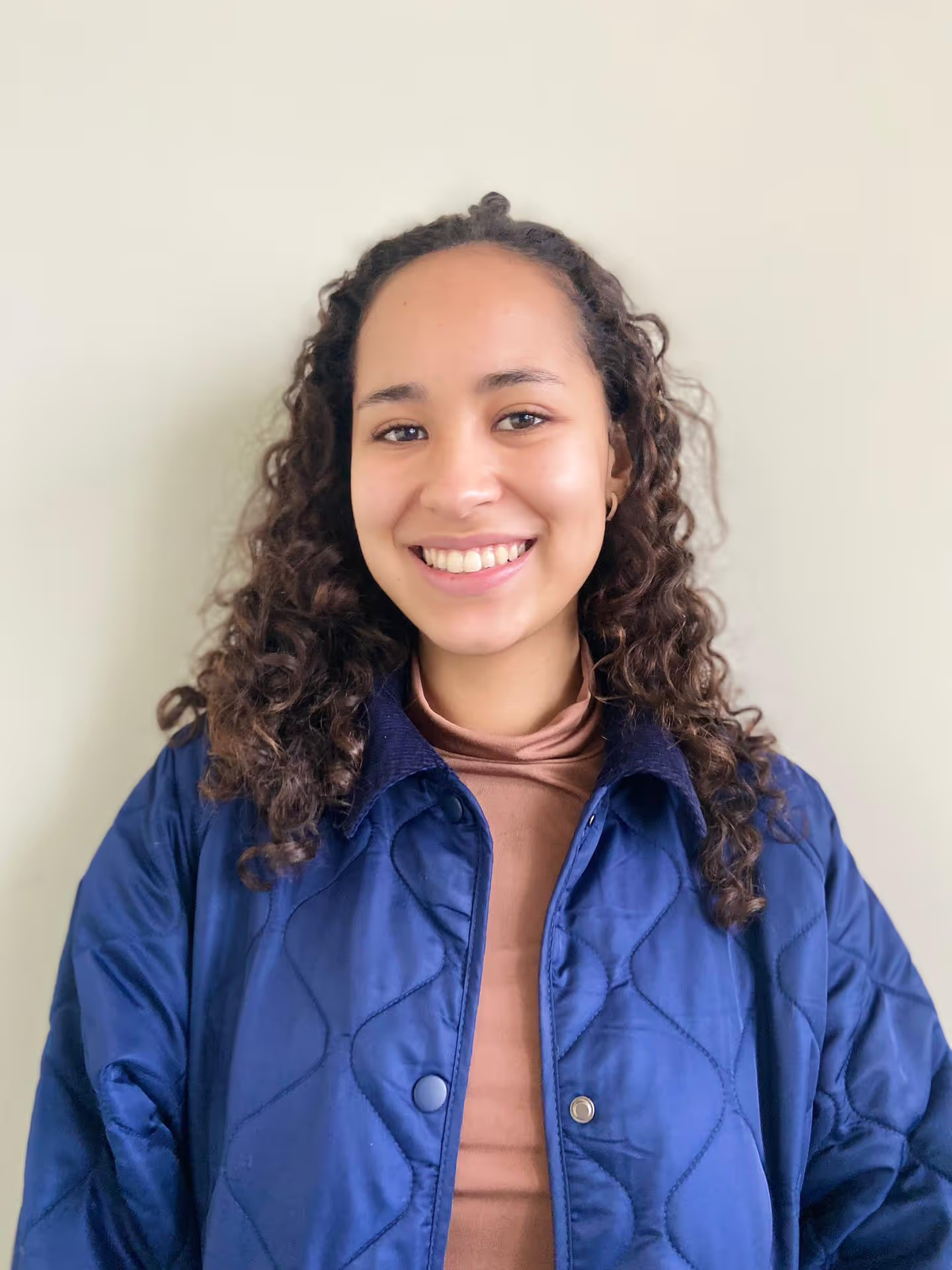The Future of Travel Search is Becoming Conversational
Smart travel leaders are recognizing a fundamental shift: travelers no longer search with destinations in mind; they search with feelings, with ideas that come from TikTok or from their favorite YouTuber. In short: the traditional travel search box is completely getting transformed.

Table of content
Smart travel leaders are recognizing a fundamental shift: travelers no longer search with destinations in mind; they search with feelings, with ideas that come from TikTok or from their favorite YouTuber. In short: the traditional travel search box is dying.
Instead of filtering "Paris, Hotel, $200 - $300," today's travelers ask, "Where can I find a romantic weekend that feels like stepping into a fairytale with a $250 budget in mind?" This isn't just a preference change; it's a complete reimagining of how people approach travel planning.
The search bar is no longer just a place to type keywords — it's becoming the starting point for a conversation. With the rise of conversational AI, static searches are evolving into dynamic, intent-driven dialogue, as more travelers turn to AI tools to discover, plan, and book their next trip.
The Rise of Vibe Searching
Traditional travel search relies on rigid categories: location, dates, price range, star rating. But modern travelers think differently. They're inspired by emotions, experiences, and aspirations. They want to find places that match their mood, not just their budget.
This shift represents what people are now calling "vibe searching"—the ability to translate abstract feelings and desires directly into concrete travel options. When someone searches for "somewhere that feels like a digital detox but still Instagram-worthy," they're not looking for a destination code. They're expressing a complex set of preferences that traditional search filters simply can't capture.
AI-powered platforms now analyze past travel behavior, real-time trends, and queries to create tailored insights that help you move far beyond the limitations of checkbox filtering and interaction with leads.
From Rigid Filters to Natural Conversations
The Old Way:
- Select destination dropdown
- Pick travel dates
- Choose price range
- Filter by amenities
- Sort by reviews
- Browse through generic results
The New Way:
- "I need something restorative but not boring"
- "Show me places where I can unplug but still feel connected to culture"
- "Find me a trip that matches the energy of my favorite playlist—Latin music"
This conversational approach doesn't just make search easier—it makes it more accurate. When travelers can express their true intentions, they find better matches. When they find better matches, they book more often and feel more satisfied with their choices.
The data supports this shift, with consumers expressing high confidence in AI-generated travel information and growing numbers already booking accommodations suggested by AI tools.
What This Means for You
As a marketing or product leader at an OTA, travel agency, or tour operator, this trend presents both a massive opportunity and an urgent challenge. The opportunity: offer a superior search experience that competitors have yet to match. The challenge: implement it before your clients run to your competitors.
Here's what you can do right now:
Immediate Actions:
- Audit your current search experience through the lens of natural language
- Identify the top 10 "vibe-based" queries your customers actually want to make
- Integrate conversational AI that understands context, not just keywords
- Create feedback loops that learn from successful bookings
Competitive Advantage:
- Own the entire inspirational journey from dream to booking
- Reduce the friction between "I have a feeling" and "I have a reservation"
- Keep travelers on your website instead of losing them to Gemini or ChatGPT
The businesses that master this transition will capture the travelers who currently bounce between inspiration platforms (Pinterest, Instagram, Google) and booking platforms (your site). By meeting travelers where they are and offering seamless support, you make it easy for them to continue their journey with you — from curiosity to conversion — instead of dropping off or turning to a competitor.
Maya: A Pioneer in Sentiment-Driven Travel Search
At Maya, we've built our platform specifically for this new reality. Our conversational AI doesn't just understand what travelers type, it understands what they mean and feel.
When someone searches for "a place that feels like my grandmother's stories about old Europe," Maya translates that sentiment into specific destinations, accommodations, and experiences from your unique inventory. It considers factors like architectural styles, cultural authenticity, generational appeal, and storytelling opportunities.
Here's how Maya transforms vague inspiration into concrete bookings:
Understanding Context: We analyze not just the words, but the emotional intent behind travel queries. Maya recognizes the difference between "peaceful" (relaxation-focused) and "quiet" (crowd-averse).
Inventory Intelligence: We connect abstract concepts to specific features in your product catalog. A request for "somewhere that feels untouched" might surface that eco-lodge in Costa Rica that you've struggled to categorize.
Personalized Matching: We learn from each interaction, building profiles that improve recommendations over time. The more travelers engage, the better the suggestions become.
Seamless Integration: Maya plugs directly into your existing website and booking system. Travelers never leave your site, and you capture revenue from the entire inspiration-to-purchase journey.


The result? Travel leaders using Maya report higher conversion rates, longer session times, and improved customer satisfaction scores. More importantly, they're not losing potential customers to other platforms.
Own the Entire Customer Journey
The future belongs to travel companies that can capture inspiration and convert it immediately into bookings. While your competitors force travelers to translate their dreams into keywords, you can offer something much more natural and convincing: a search experience that actually understands human nature.
By implementing conversational, sentiment-driven search, you're not just upgrading your technology—you're claiming ownership of your customers' entire travel decision-making process. Instead of being one stop on their research journey, you become the destination where travel dreams turn into confirmed reservations.
The travelers are ready for this change. More consumers are turning to AI tools to discover new places and help them plan and book their trips, with this trend expected to grow significantly in 2026. The question isn't whether conversational travel search will become the standard—it's whether you'll lead this transformation or follow it.
Ready to transform how travelers find and book with you?
Book a 15-minute call to see how you can capture that inspiration and convert it into revenue.
New mobile apps to keep an eye on
Auctor purus, aliquet risus tincidunt erat nulla sed quam blandit mattis id gravida elementum, amet id libero nibh urna nisi sit sed. Velit enim at purus arcu sed ac. Viverra maecenas id netus euismod phasellus et tempus rutrum tellus nisi, amet porttitor facilisis aenean faucibus eu nec pellentesque id. Volutpat, pellentesque cursus sit at ut a imperdiet duis turpis duis ultrices gravida at aenean amet mattis sed aliquam augue nisl cras suscipit.
- Commodo scelerisque convallis placerat venenatis et enim ullamcorper eros.
- Proin cursus tellus iaculis arcu quam egestas enim volutpat suspendisse
- Sit enim porttitor vehicula consequat urna, eleifend tincidunt vulputate turpis
What new social media mobile apps are available in 2022?
At elit elementum consectetur interdum venenatis et id vestibulum id imperdiet elit urna sed vulputate bibendum aliquam. Tristique lectus tellus amet, mauris lorem venenatis vulputate morbi condimentum felis et lobortis urna amet odio leo tincidunt semper sed bibendum metus, malesuada scelerisque laoreet risus duis.

Use new social media apps as marketing funnels
Ullamcorper pellentesque a ultrices maecenas fermentum neque eget. Habitant cum esat ornare sed. Tristique semper est diam mattis elit. Viverra adipiscing vulputate nibh neque at. Adipiscing tempus id sed arcu accumsan ullamcorper dignissim pulvinar ullamcorper urna, habitasse. Lectus scelerisque euismod risus tristique nullam elementum diam libero sit sed diam rhoncus, accumsan proin amet eu nunc vel turpis eu orci sit fames.
- Eget velit tristique magna convallis orci pellentesque amet non aenean diam
- Duis vitae a cras morbi volutpat et nunc at accumsan ullamcorper enim
- Neque, amet urna lacus tempor, dolor lorem pulvinar quis lacus adipiscing
- Cursus aliquam pharetra amet vehicula elit lectus vivamus orci morbi sollicitudin
“Sit enim porttitor vehicula consequat urna, eleifend tincidunt vulputate turpis, dignissim pulvinar ullamcorper”
Try out Twitter Spaces or Clubhouse on iPhone
Nisi in sem ipsum fermentum massa quisque cursus risus sociis sit massa suspendisse. Neque vulputate sed purus, dui sit diam praesent ullamcorper at in non dignissim iaculis velit nibh eu vitae. Bibendum euismod ipsum euismod urna vestibulum ut ligula. In faucibus egestas dui integer tempor feugiat lorem venenatis sollicitudin quis ultrices cras feugiat iaculis eget.
Try out Twitter Spaces or Clubhouse on iPhone
Id ac imperdiet est eget justo viverra nunc faucibus tempus tempus porttitor commodo sodales sed tellus eu donec enim. Lectus eu viverra ullamcorper ultricies et lacinia nisl ut at aliquet lacus blandit dui arcu at in id amet orci egestas commodo sagittis in. Vel risus magna nibh elementum pellentesque feugiat netus sit donec tellus nunc gravida feugiat nullam dignissim rutrum lacus felis morbi nisi interdum tincidunt. Vestibulum pellentesque cursus magna pulvinar est at quis nisi nam et sed in hac quis vulputate vitae in et sit. Interdum etiam nulla lorem lorem feugiat cursus etiam massa facilisi ut.












.svg)